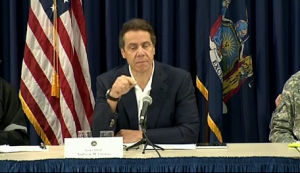A Summary of Our Academic Conference, The Unstable and [de] Mutable Boundaries Between Meteorological Atrocities and Human Political Economies with Bodies-as-Subjects Coming Into Being As They Are
The approach of Hurricane Sandy has already altered the entire course of me and my friend’s lives. On Sunday, I was supposed to shop for vintage sweaters and attend a poetry brothel. These would’ve probably been some wonderful moments. But Hurricane Sandy put a stop to all my hypothetically marvelous adventures.
Instead my friends and I were bunkered in our apartment in Alphabet City.
What were we to do?
If we were VIDA, then we could count the number of times a masculine pronoun appeared in this week’s NYT Book Review and then compare it to the number of times that a feminine pronoun appeared in this week’s NYT Book Review and then get really angry about it and channel all of our anger into a neat and tidy chart.
If we were overly anxious New York Jews then we could close down the subway system at 7 PM, hold press conferences using folksy idioms like “up and about,” and dress like men who spend a great deal of time in well-off subdivisions of Connecticut.
Also, if we were male homosexuals, we could have sex nonstop sans condoms.
But my friends and I aren’t any of those things. So, in lieu of that, we chose to hold an academic conference that had an awful lot of relevance to our current predicament. Our conference, which was held last night (28 Oct. 2012), was called The Unstable and [de] Mutable Boundaries Between Meteorological Atrocities and Human Political Economies with Bodies-as-Subjects Coming Into Being As They Are. This conference has already been compared to some of the most vivid and vivacious academic conferences ever held.
Here’s a summary:
I was supposed to give the opening address.
But, in an act of academic one-upmanship, Stephanie Berger gave the opening address by reminding every conference attendee why they were summoned here.
“It’s about people and their reactions to hurricanes,” said Stephanie, solemnly.
Then, in another act of blatant academic one-upmanship, Carina Finn began reading from On The Line by the French theoretical duo Deleuze and Guattari
“Why have we kept our names?” read Carina. “Solely out of habit.”
And with that, the panels officially began.
The name of our first panel was Logs: The Diminished But Not Diluted Potentialities Of Rhizomic Law and Subsequent Deleuzian “Things.”
The origin of this panel derived from speculation that a log, due to the great gusts of wind, would come flying through our window, thus killing us all.
I declared that it’d be entertaining if a log did that, as it would be rather like a Hollywood film.
Stephanie, with much weariness, said that if a log did do that then at least expectations would be met. As of that moment, besides some windiness, nothing disaster-like was occurring, and Stephanie would appreciate some compensation for the sacrifices she’s made, like postponing her Poetry Brothel.
Carina said it was the symbolism of the log coming through the window much more than an actual log coming through the window that discomfited her.
When Stephanie asked Carina point-blank if she wanted the most abject weather situation (i.e. a log flying through the window and murdering us all), Carina replied, “I’d prefer nothing bad to happen.”
The next panel was in the shape of a poem entitled Hurricane Marty Markowitz. This took place “off-site,” so no one saw it except the poem-giver, Stephanie.
Our third panel — Reunderstanding the American and/or British Literary Cannon Solely from the Subject Position of Weather Phenomena — centered around a close reading of Robert Creeley’s “The Rain.”
Stephanie observed that the line breaks of Creeley’s quatrains resembled those of the storm.
After making some other points, Carina put forward the belief that crises are caused when human subjectivity and weather subjectivity interact.
“The two exist fine when they don’t interact,” said Carina. “But when they do, it’s disastrous.”
Stephanie then compared weather to a selfish, self-obsessed starlet who only cares about texts that include it.
Weathery Cinematic Structures of Where The Heart Is, or, Ashley Judd, Natalie Portman, Country Music was the title of our fourth panel.
Stephanie and Carina concurred that Where The Heart Is is not sunny since the mood of the film is supposed to be bleak. They employed phrases like “typical Hollywood” in their discussion and made connections to the final scene of Breakfast at Tiffany’s, the importance of having a home, and externality.
A special guest star, Joyelle McSweeney, chaired the fifth panel — Weather Conditions and Their Effect (If Any) On Dis-empowered Bodies In Sub-Economic Landscapes. For this, the Fence leading leady sent in a link to this pertinent song.
The sixth panel — Stop It Now: Weather And Its Unsustainable (Unethical?) Preoccupation with Cheese-based Foodstuffs – was canceled because I was supposed to be the driving force behind it but I couldn’t be the driving force due to ice cream.
The seventh panel was called Climate Conditions Necessary to Sustain Livable and De-subjugated Costumes for the 22nd-Century World Space.
This panel marked the inevitable arrival of Judith Butler and her performance theory.
Carina said that weather disasters weren’t costuming, they were just scary, since they could bring about the end to physical bodies.
I stated that the body becomes extinct when it no longer has anything to perform, which reinforces Butler’s claim that gender (or basically everything) is a performance. — when the show ends, so does the body.
Carina briefly speculated on weather’s relationship to Artaud’s Theatre of Cruelty. But then she said that there must be a crisis point which is no longer performative.
Stephanie, agreeing with Carina, proposed that weather crises are the antidote to performance.
The penultimate panel to our conference involved responding directly to the question: Are the Boundaries Between Meteorological Atrocities and Human Political Economies with Bodies-as-Subjects Coming Into Being As They Are Unstable and [de] Mutable?
There seemed to be a consensus that the boundaries are more stable and [de] mutable than they seem.
There is some constant standard – based on a variety of factors including the type of government and type of economic system – in which one can predict how a storm will be perceived in relation to the subjects that it affects.
For example, the storm has already killed 65 people in the Caribbean. These deaths have gone rather unnoticed. If 65 American bodies died, it certainly wouldn’t be underreported.
The final panel took the shape of an interpretive dance to Bob Dylan’s “Hurricane,” obviously. This, though, was another “off-site” event, which meant only the creature performing the performative dance – me – saw it.
Tags: academic conference, carina finn, hurricane sandy, joyelle mcsweeney, judith butler, marty markowitz, mayor bloomberg, New York City, stephanie berger, weather, where the heart is


